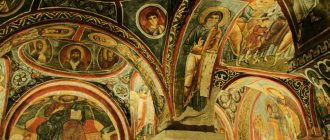The meaning of the word "in vain"
The books used by the Orthodox Church are written in Church Slavonic. Translation of liturgical texts is unacceptable, because the Church Slavonic language, unlike Russian, is one of the few liturgical languages. Orthodox Christians should not demand translation for the sake of their laziness. Efforts should be made to understand the meaning of ancient words, because they have the maximum capacity.
Origin
The word “in vain” several centuries ago was used as widely as, for example, “paki” or “zelo”. This word has its roots in the Old Church Slavonic language, created by Equal-to-the-Apostles Cyril and Methodius, from which Russian originated. It turned out that this word can be found not only in Russian, but also in other related languages. It originates from “in” and “in”. According to the etymology, “sui” means “empty”, “vain”. This is where the rest of the same root words come from: vain, vanity, etc.
Common meanings of the word "in vain"
Meaning of the concept
In Ozhegov’s explanatory dictionary, the concept “in vain” is deciphered as “in vain, in vain (to remember, to name; in relation to someone respected, high).” In Orthodoxy, taking the name of the Lord in vain is a sin. Ozhegov’s interpretation is closest to the Orthodox understanding of the word “in vain.” It is impossible to know when and under what conditions this word was first uttered.
Interpretation of the commandment: Do not take God's wealth in vain
Interpretation of the commandment: Do not take God's wealth in vain
The third commandment teaches: “You shall not take the name of the Lord your God in vain.” Literally, the name of the Lord, as a sacred thing, should not be used in everyday conversations, that is, without a sense of reverence for Him who revealed Himself to us in this name.
The name of God becomes a fiery retribution and punishment for those who swear by it falsely, turn it into a joke or accompany the mention of it with abuse. When we pronounce the name of God, it is as if we are touching His robe with our hand. When we pronounce the name of God, the all-seeing eye of the Lord is directed into our heart. The name of God must be pronounced with the same reverence with which we worship an icon and apply our lips to it. We can say that the name of God is a verbal icon of the One who is above thought and words, who is eternal and infinite, who is incomprehensible by thought and inexpressible in human language.
In spiritual terms, our heart should become that apocalyptic stone on which the mysterious name is written - this is a white stone, a symbol of purity. The heart should become the soil on which the icon of God is written as His name. There is a reciprocal process here: a person’s life prepares his heart for prayer, and prayer sanctifies a person’s life.
The ancient fathers did not have books or developed teachings about the Jesus Prayer, but they had a purity of heart and thoughts that attracted the grace of God, and grace itself prayed in their hearts. They seemed to listen in reverent amazement to the ineffable words of this spiritual prayer: the Lord Himself was its teacher. The impurity and deceit of our hearts are the main obstacle to the Jesus Prayer.
It is difficult to paint an icon on a crumpled, uneven, cracked board. Our life does not correspond to prayer, therefore - despite all the books that reflect the experience of the holy fathers who succeeded in inner prayer, their advice, their methods are given (that is, in modern language, the technique of prayer) - it is not grafted into our heart .
Without correcting our lives, but only repeating the words of prayer, we want to combine the incompatible. And a poor man can invite a king to his wretched hut, but we call God into the dwelling of our soul, full of dirt, stinking from our mental depravity; where thoughts and images, born of malice and hatred, are milling about, similar to the swearing and fighting of drunken people. Into this filth, which we do not want to part with, we invite the King of kings! Therefore, prayer “divorced” from our life as a whole remains fruitless.
The rose cannot take root among the stones: its root dries up and the flowers fade. A person works on prayer, but does not see the result and therefore most often gives it up. He digs a well in the sands of the desert and cannot reach the water; All that remains from all the labor is a pile of dug up earth. Our mistake here is that we perceive prayer as something abstract in relation to our life, while prayer is an exam, and life is preparation for it. Salvation is achieved through the interaction of the Divine and human will. In this sense, not only man without God, but also God without man is “powerless.”
The Creator of the worlds gave man internal moral freedom, autonomy, and does not take His gift back. The Omnipotent and Almighty, as it were, limited Himself in front of the human person; He gave man the opportunity to freely direct and develop his will. This is the godlikeness of man, this is his greatness and responsibility. But this also conceals the metaphysical danger of freedom.
A person who engages in prayer, but does not change his life, seems to hope that God will accomplish his salvation Himself, that prayer itself will automatically turn into “salvation by necessity.” Therefore, failure awaits a person here, one might say, spiritual collapse. Prayer turns into a combination of words, and words into a combination of letters or sounds.
Prayer must be accompanied by a constant feeling of repentance, that is, dissatisfaction with one’s life, condemnation, rejection of it and the desire to start a new life. This desire must be of a strong-willed nature; there must be the determination to translate it into deeds and actions. In every life situation, a person needs to think: “How will this affect my prayer? Will I gain grace or lose it? To put it briefly, our whole life should be a background of prayer.
A person must constantly cleanse his heart of thoughts and passions. The most important and universal passion is self-love, which manifests itself as pride, this spiritual isolationism, opposing oneself not only to people, but also to God.
Then - three passions: love of money - attachment to money and things, which is often expressed in hoarding - hope for the external and dead; voluptuousness is the lust of the soul, the thirst for pleasure, the false desire to find happiness in the satisfaction of one’s passions, sweetness at the bottom of which there is bitterness, an illusion that, dissipating, leaves the soul empty; love of fame is a lie of the soul that turns a person into an actor playing on the stage of life for the approval and applause of the crowd that the person himself despises in the depths of his heart.
These passions, blinding a person, give rise to three others: unreason - when a person replaces the main goal of his life - communication with God - with communication with the world; ignorance - when a person disconnects himself from the inner, spiritual life, which gives true knowledge and wisdom, and switches exclusively to the study of the external, which makes him spiritually blind; oblivion - oblivion about eternity and death, about the lessons that life gives him.
This state is similar to intoxication: a person voluntarily surrenders to passions, forgetting what awaits him upon sobering up - the laughter of demons at his soul. A drunkard, waking up somewhere under a fence, robbed by his own friends, in his own filth, soon forgets about the shame he experienced and again reaches for wine. This is the constant oblivion of the sinner, the constant search for happiness in a dirty puddle. A person can experience the most severe suffering, but forget everything and learn nothing.
In general, the holy fathers point to eight main passions, eight ulcers of the human soul, eight springs from which the dead waters of sin flow. These passions and the struggle against them are described in detail in the ascetic collection “Philokalia.” Without cleansing the soul of passions, without constant internal work on oneself, success in the Jesus Prayer is impossible: a person will be like scooping up water with a broken, leaky vessel, and the water will immediately pour out onto the ground, but the vessel will remain empty.
The spiritual plan of the third commandment is a return to the same apocalyptic image: on the white stone, that is, on the repentant heart, where internal tears wash away the dirt of passions, the Holy Spirit writes a new name. For such a soul, the name of Jesus Christ is always new; it is revealed to it in new depths, in new beauty, in its eternal uniqueness. The white stone means the possible renunciation for a person not only from sinful, but also from worldly thoughts in general, from that which is outside of God, from that which by its nature is alien to the soul. The white stone with a mysterious name written on it, which no one knows (this state cannot be conveyed in words, it belongs only to the one who experienced it), is the eternal glory of the saints, for whom God has become the entire fullness of their being.
To fulfill the third commandment means to subordinate your entire life to the name of God, to fill the time of your entire life and the space of your entire heart with it.
O. Rafail (Karelin)
Similar
Biblical commandment
The commandment not to take the name of God in vain is found in the Old Testament. It has not been abolished in our New Testament times.
History of the phrase
In the third month after the people of Israel were led out of Egypt through the parting of the Red Sea, the Lord told Moses that the saved people would become a holy nation if they obeyed God and carried out His words. The people promised this, and God descended on Mount Sinai in fire. Everyone saw fire and smoke, heard the voice of God, thunder and the sound of a trumpet. And the Lord gave commandments to the people. The first of these is known to us as the “Ten Commandments.” The commandment not to take the Name of God in vain is the third in line.
Interpretation of the commandment
The name of God is power. People should treat it with respect and not use it in their idle conversations. In the name of the Lord, many miracles and healings have been and are being performed. Whenever a person calls on the Lord, He invisibly responds to the call of his child. It is important to understand who we are addressing and what we are putting into our call. We must also not forget about the second part of the commandment, which promises punishment for everyone who does not fulfill it.
Ten Commandments of God
Clarification of the following facts helps to understand the commandment more deeply:
- The Lord is omnipresent. It is closer to a person than the air in his lungs.
- According to some researchers, the exact translation of the commandment is the command not to bear the name of God falsely.
In fact, the commandment protects a person not only from mentioning the name of God in vain out loud, but also in thoughts and actions.
Don't take the Lord's name in vain
As the Bible says, on Mount Sinai the Lord himself gave the prophet Moses 10 commandments on the fiftieth day of the exodus of the children of Israel from Egypt. The Bible spares no color in describing this significant event: thunder roared, lightning flashed, the earth trembled... But the noise of the raging elements covered the voice of the Lord, who proclaimed these Commandments. God then inscribed them on the “Tablets of Testimony” and gave them to Moses.
History of the phrase
In addition to the well-known provisions: I am your God, do not make an idol, remember the Sabbath day, do not kill, honor your father and your mother, do not kill, do not commit adultery, do not steal, do not bear false witness, do not covet your neighbor’s house and wife, there is also such - do not bother your Lord in vain. It's the third one.
Do not take the name of the Lord in vain - the meaning of this phrase is not always correctly understood. Below we will analyze its interpretation, but for the first presentation the formula “thou shalt not take the name of the Lord thy God in vain” is sufficient. This is a very important statement; its understanding contains the key to understanding the sacred meaning of all Abrahamic beliefs, dating back to the patriarch of the Semitic tribes Abraham (among Muslims Ibrahim).
In some holy books, addressing the Almighty is not used at all. The high priest called him only once a year during the Easter service.
The canonical image of Abraham (Ibrahim) and the requirement to reverently honor the Creator are reflected both in the New and Old Testaments, and in the Holy Koran. This position is enshrined in many Muslim hadiths and Orthodox parables.
A pious man, remembering the name of God, says:
“Two things I ask of You, do not refuse me, before I die: remove vanity and lies from me, do not give me poverty and wealth, feed me with my daily bread, so that when I am full, I do not deny [You] and say: “Who is the Lord?” and lest, being poor, I should steal and take the name of my God in vain” (Prov. 30:7-9).
Interpretation of the commandment
The Lord God cannot only be scolded, but also remembered in empty conversations and jokes. The holy scriptures demand that we treat Him with reverence and reverence. This name has the greatest power; the New Testament contains numerous examples when, with its help, Jesus Christ performed real miracles.
It is also not permitted to take oaths or vows in the name of God, except in exceptional cases. This behavior of people devalues the meaning of God in their lives and makes it down to earth. One should not turn to the Lord casually, without having a serious mood for intimate communication with the Almighty.
However, a more accurate translation of the third commandment, “thou shalt not take the name of the Lord in vain,” according to experts, will be slightly different; it reads as follows: “thou shalt not bear the name of the Lord falsely.” And they put a deeper meaning into it than just a ban on casual pronunciation.
Orthodox Rabbi Joseph Telushkin points out:
“A more literal translation of “lo tissa” would be “You shall not bear,” rather than “You shall not take,” and that thinking about this helps everyone understand why the commandment is equated with others such as “Thou shalt not kill” and “Thou shalt not commit adultery.” .
Why you need to remember God less often
You must always remember the Lord and constantly call upon Him in prayer, asking for mercy. In the words of the holy Apostle Paul: “...pray without ceasing.” The Name of the Lord heals, strengthens, helps in the fight against thoughts, passions, visible and invisible enemies. But a person will earn punishment for himself and anger the Lord if he makes His name a weed word and mindlessly inserts it into any sentences.
Mentioning God casually contributes to the loss of the fear of God and reverence. A hackneyed word does not have any influence on a person, because he himself has devalued it, he himself has ceased to respect and honor his Creator and His name.
We must always remember the Lord and constantly call upon Him in prayer, asking for mercy.
Clarifications in the Old and New Testaments
The Bible has many interpretations and instructions for the correct fulfillment of the commandments. Thus, in the book of the Old Testament: Deuteronomy it is said to fear the Lord, serve only Him and swear by His name. Failure to fulfill an oath, giving a false oath in the name of God was a violation of the law, a sin. In the New Testament (in the Gospel of Matthew) we have a complete explanation of the commandment from the lips of the Lord Jesus Christ himself. He explained to the people in detail so that they should not swear by anything, because heaven is the throne of God, and the earth is His footstool.
The name of God is strong and holy. It must not be mixed with empty chatter. Every person should treat him with reverence.
If you find an error, please select a piece of text and press Ctrl+Enter.
Orthodox Life
Website of the Gorlovka and Slavic diocese
What does it mean to “not take the name of the Lord in vain”?
Commandment 3: “You shall not take the name of the Lord your God in vain, for the Lord will not leave unpunished anyone who takes His name in vain.”
What does the prohibition given to us in this commandment mean? He implies that there is no need to mention God in empty conversations that have nothing to do with faith and the Church. But the question arises: what is meant by the words “the name of God”? To answer it, we must turn to the Old Testament times when our first parents lived. On the pages of the Old Testament we find such names of God as Elohim, Eloh, Adonai, Hosts, Yahweh. However, you need to understand that they all both relate to God and do not relate to God at the same time, because God is incomprehensible, and it is impossible to describe or designate Him. No name can reveal His essence.
It turns out that, on the one hand, we cannot pronounce the name of God in vain, on the other hand, we do not know it. Names are just manifestations of God in the world, but not the Lord Himself. Our holy fathers wrote about this. For example, St. Basil the Great taught: “There is not a single name that, having declared the entire nature of God, would be sufficient to express it.” St. John of Damascus asserted: “The Divinity, being incomprehensible, will certainly be nameless. So, not knowing His being, let us not seek out the name of His being.” And Saint Dionysius the Areopagite wrote that the essence of God is incomprehensible and unnameable. In his essence, God becomes “infinitely many-named.”
If we draw an analogy with the created world, then the name reveals the essence of a phenomenon, an object, a living being. But the name of God does not reveal the essence of God; it is only an indirect indication of His existence and actions. When the Lord created Adam, He made him intelligent and commanded him to name all the animals, because he knew the essence of each of them. Adam also gave his wife a name - according to the same principle: Eve means “life”, because from her will come the life of the entire human race.
In my opinion, when the Lord gives people the third commandment, He forms in them the concept of shrine - so that a person treats God and everything connected with Him with trepidation. He sets moral boundaries. We should understand that there are things in relation to which we must either remain silent or speak with special reverence, trembling, love, special fear - we call it the fear of God. Let me emphasize once again that the Lord gives a specific concept of shrine: this is everything that is connected with Him. Of course, this is the Holy Scripture, the Church, the sacraments, but besides this - the life and world that He created, because the greatness of the world emphasizes the greatness of its Creator.
The third commandment was very important for the Old Testament times, because humanity forgot the true God and His faith, created many idols, temples, idols and began to worship them. So that it does not dissolve in these errors, the Lord commands not to remember His name in vain. It was necessary to cultivate awe before the shrine. However, this commandment is very relevant today.
In Old Testament times there was one situation, with the advent of the New Testament it changes radically, but people are people, and earthly society is a problematic society. If earlier it was religious, now it is becoming secular. This means that people in general are far from God and the Church. Today's believers call themselves Christians, but can we call ourselves that? Unfortunately, we are very far from those Christian ideals and principles that were alive in the times of the apostles and great saints. It’s a stretch to call us Christians, believers, church people. A person must take himself very seriously and critically. Each of us needs to determine how believer and pious he is, how relevant Christ, His Holy Church and everything that He taught is relevant to him.
The world is secularizing, and now everywhere we hear the name of God: in everyday life, from phone screens, in films, programs, some shows. There they often remember the name of the Lord in inappropriate situations, and even openly blaspheme and blaspheme. This always bothers me. In such a widespread situation, it is better for believers to try to take care of themselves, try not to break the third commandment and remain silent as much as possible.
The saints teach that it is better not to talk about Christ, but to live in such a way that they would ask us about Him. We must do, not talk. Nowadays, everyone talks too much. We have so many possibilities for this! You can open your own channel on YouTube, do broadcasts, streams, online broadcasts. People use all this, which means they talk. This is a bad way. It is better to remain silent and affirm Orthodoxy not in words, but in deeds. Such were the pioneers of Christianity - the apostles and great saints of the first centuries. People went to them in the desert and found in them a living example, the ideal of Christianity. This is how Christ Himself was: He spoke little and did much. He didn’t write anything, but His works are alive. He had not a verbal, but a real Christianity, which has been alive for almost two thousand years.
The New Testament teaches us to honor the name of our Lord and God Jesus Christ and everything connected with His Church, because we confess “the Son of God, the only begotten, who was born of the Father before all ages; Light from Light, true God from true God, begotten, uncreated, consubstantial with the Father, by whom all things were.” For us, the name of God is the name of the Savior, the Messiah, the Son of God, who came into the world, lived, preached, was crucified and resurrected. He founded the Church, of which we also became members. We need to value this. We need to talk about all this with trepidation, love and fear of God. We must try not to use exclamations like “Oh my God!” and the like, because they turn into ordinary interjections and are completely devoid of the feelings that I spoke about.
I am reminded of Victor Hugo’s story “Toilers of the Sea,” which tells how in one of the small coastal towns a teacher was kicked out of school because, having dropped a pair of scissors, she exclaimed “Oh God!” This was perceived as inappropriate behavior on her part. Now it’s strange to read something like this, but it seems to me that this story gives reason to reflect on how much society’s attitude towards the third commandment has changed.
Who has the right to pronounce the name of God? Those who connected their lives with God and faith, first of all, are priests and monks. Everyone else is allowed to do this in church, during prayer, during worship. Of course, it is impossible not to mention the name of God during communication on religious or theological topics when you are asked about God. But it’s not worth it in empty talk and chatter. It is also bad when a person begins to instruct, teach, or impose his religious views on someone. If someone does not want to hear about God, you should not talk to him about Him, because this will only cause misunderstanding. That is, you can call on the name of the Lord, but you should not do it in everyday life, in vain. If we put into practice all of the above, this will be an ideal observance of the third commandment.
Archpriest Alexander Khvorost










